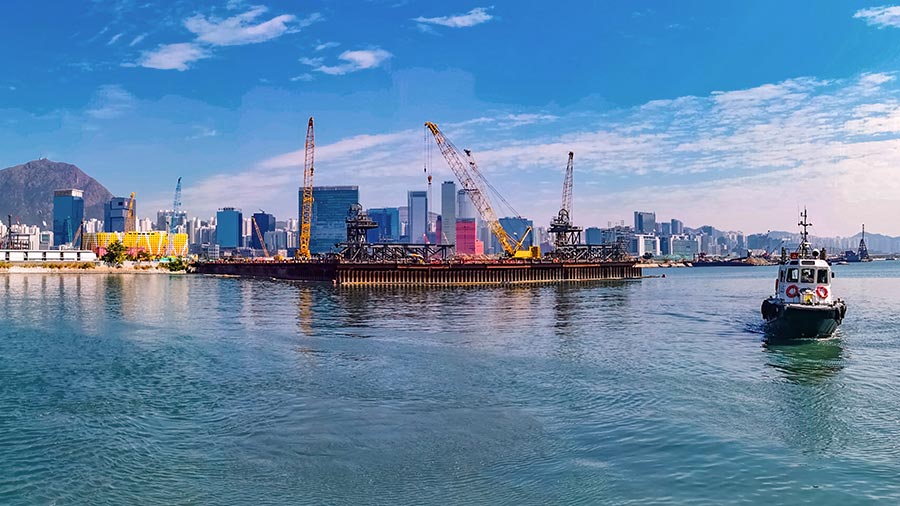Hong Kong has been actively seeking to expand its Free Trade Agreement (FTA) network to secure favorable conditions for its goods and services to enter the mainland and international markets.
Hong Kong has signed eight FTAs:
- The Mainland of China (June 2003);
- New Zealand (March 2010);
- The Member States of the European Free Trade Association (EFTA) (June 2011);
- Chile (September 2012);
- Macau (October 2017);
- The Association of Southeast Asian Nations (ASEAN) (November 2017); and
- Australia (March 2019).
It has also concluded the FTA negotiation with the Maldives and commenced negotiations for an FTA with Peru on January 30, 2023.
Mainland China and Hong Kong CEPA
The Mainland and Hong Kong Closer Economic and Partnership Arrangement (CEPA) holds significant importance. It provides expansive opportunities for Hong Kong’s goods and services, further enhancing the economic cooperation and integration between the Mainland and Hong Kong.
CEPA follows a progressive building block approach, with both sides collaboratively introducing ongoing liberalization measures.
Despite Hong Kong's integration with China, variations exist in terms of tariffs, duties, and Hong Kong's status as a Free Port. Mainland China and Hong Kong established CEPA in 2003 to address these distinctions. CEPA is an evolving Free Trade Agreement (FTA), continually expanding its scope and content.
CEPA encompasses four broad areas:
Trade in goods
Trade in goods has been fully liberalized. Hong Kong’s products that fulfill the CEPA rules of origin (ROO) requirements can enjoy zero-tariff treatment upon importation into the mainland.
Trade in services
Substantial progress has been made in liberalizing service trade between the Mainland and Hong Kong. Businesses and individuals in Hong Kong's service sectors can leverage preferential arrangements to conduct and expand their operations in most Mainland sectors.
Investment
Hong Kong investments and investors enjoy investment protection and facilitation in the mainland.
Economic and technical cooperation
The two sides have agreed to enhance economic and technical cooperation in various areas to cater for and support the development between the two places and promote collaboration in the financial and trade zones of the Belt and Road Initiative and Sub-regional Cooperation.
Hong Kong - New Zealand CEPA
The Hong Kong-New Zealand Closer Economic Partnership Agreement is Hong Kong's first FTA with a foreign economy and the second FTA following the Closer Economic Partnership Arrangement with Mainland China.
New Zealand was Hong Kong's 42nd largest trading partner in 2022, with merchandise trade amounting to HK$7.7 billion (US$984 million) in 2022. Regarding services trade, New Zealand was Hong Kong's 37th largest trading partner in 2021, with bilateral services trade amounting to HK$1.1 billion (US$140 million).
The CEP Agreement is a comprehensive and high-quality FTA that is entirely consistent with the rules of the World Trade Organization. It comprises trade liberalization measures for trade in goods and services between the two signatories.
Hong Kong and the member states of the EFTA FTA
Hong Kong and the Member States of the European Free Trade Association States, namely Iceland, Liechtenstein, Norway, and Switzerland, signed a comprehensive FTA in Liechtenstein on June 21, 2011. This agreement is Hong Kong's first FTA with the European economies.
It is an essential milestone in Hong Kong's trade relations with the four EFTA states.
The agreement covers trade in services and goods, investment, and other trade-related issues, such as intellectual property protection.
The European Free Trade Association (EFTA), taken as a single entity, was Hong Kong's 16th-largest trading partner, with merchandise trade between the EFTA and Hong Kong amounted to HK$80.9 billion (US$10.3 million) in 2022. The EFTA was the 14th largest trading partner for services, with bilateral services trade totaling HK$13.5 billion (US$1.7 million) in 2021.
Hong Kong and Macao CEPA
Macao was Hong Kong’s 18th-largest trade-in goods partner in 2021, with bilateral trade between these two economies amounting to HK$69.5 billion (US$8.8 million). Further, Macao ranked 21st among Hong Kong’s trade-in service partners in 2021, with a total bilateral trade of approximately HK$5.1 billion (US$652,402).
Macao also played a significant role as the 17th major source of inward direct investment (IDI) into Hong Kong at the end of 2021. The total stock of IDI from Macao to Hong Kong was HK$38.4 billion (US$4.9 million). Furthermore, Macao was the 12th major destination for outward direct investment (ODI) from Hong Kong, with the stock of ODI in Macao amounting to HK$97.6 billion (US$12.4 million) at the end of 2021.
These figures underscore the significant economic bonds between Hong Kong and Macao, with robust trade and investment activities playing a pivotal role in strengthening their bilateral relations.
ASEAN-Hong Kong FTA and Investment Agreement
The AHKFTA and AHKIA cover goods, services, investment, cooperation, dispute resolution, and more. They benefit trade partners and foreign investors in Hong Kong, mainland China, and ASEAN, fostering trade and investment growth.
ASEAN nations must reduce customs duties on Hong Kong goods, cutting costs for Hong Kong businesses and boosting competitiveness globally.
Hong Kong’s service sector gains in professional, business, telecom, and construction services. The investment agreement ensures fair opportunities in ASEAN countries, with compensation for unforeseen losses.
Hong Kong, a key hub for global trade and services to mainland China and ASEAN, strengthens its role with the FTA, attracting foreign investors and ASEAN SMEs.
ASEAN ranks Hong Kong second in merchandise trade in 2022 and fifth in services trade in 2021, with HK$1.2 billion (US$153,503) in merchandise trade in 2022 and HK$101.1 billion (US$12.9 million) in services trade in 2021.
Hong Kong and Australia FTA
Under the HKAFTA, a reciprocal elimination of import tariffs will be enforced on all goods from Australia and Hong Kong. Some goods, such as consumables, can now enter the market via simplified procedures.
Financial, professional, accounting, engineering, construction, education, transport, and logistics providers are now guaranteed market access and treatment similar to local service provider counterparts under like circumstances.
The HKAFTA also allows deeper financial ties to be forged, as Australian banks in Hong Kong have access to streamlined establishment requirements in Hong Kong.
Moreover, business travel will be made easier through the agreement as temporary entries may be granted to Hong Kong and Australian business travelers to improve the ease of business in each location.
The HKAFTA aims to safeguard many of the liberal trade policies currently adopted by Hong Kong and Australia and commits both economies to eliminate all tariffs. It will bring relief to manufacturers, suppliers, and businesses alike.
Hong Kong and Chile FTA
Chile ranked as Hong Kong’s 3rd largest trading partner in Latin America in 2021, with the total bilateral merchandise trade reaching HK$20.9 billion (US$2.6 million).
The trade agreement between Chile and Hong Kong covers various aspects such as trade in goods and services, investment, and other related areas. Remarkably, it marks the first Free Trade Agreement (FTA) between Hong Kong and a South American economy, presenting promising opportunities for Hong Kong businesses to access the Chilean market, both an emerging market and a gateway to the broader South American region.
This FTA also extends Hong Kong’s FTA network to the American region, complementing its connections with the Asia-Pacific and European regions.
Alongside the FTA, Hong Kong and Chile have signed a separate Memorandum of Understanding (MoU) on Labor Cooperation. This MoU addresses labor-related matters of mutual interest between the two nations, further enhancing their bilateral relations.
Double Taxation Avoidance Agreements
Hong Kong has signed comprehensive DTAs with 46 countries and is negotiating agreements with 14 others. The DTAs specify the tax rates for dividends, interest, royalties, and technical fees these countries can charge Hong Kong residents. The methods for eliminating double taxation are outlined in each DTA or the country's domestic law, with the tax credit method being the most common.
Hong Kong's Double Taxation Agreement (DTA) network provides a mechanism to mitigate the challenge of double taxation faced by global investors. Hong Kong follows a territoriality-based taxation system, taxing only income sourced within the SAR, thus avoiding double taxation for its residents.
Additionally, Hong Kong offers unilateral tax credit relief to its residents who operate businesses in other countries, ensuring they avoid issues with double taxation.
To further reduce tax burdens for companies operating in Hong Kong, the Advance Pricing Arrangement (APA) program was introduced. The APA allows taxpayers to engage transparently with tax authorities to determine appropriate criteria for pricing-related party transactions over a fixed period.












